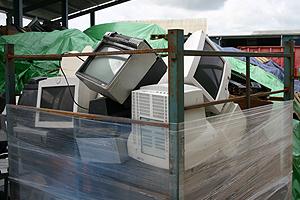The announcement comes after a warning in BERR's proposals for revisions to the WEEE Regulations, (published last week) that only “planned and agreed” trading that was detailed in schemes' operational plans would be allowed.
Electrolink chief executive Barry Van Danzig welcomed the proposals, claiming they would “serve to enhance and strengthen the performance of the WEEE Regulations”.
And, he revealed that, following the BERR announcement, his scheme would be looking to finalise trading arrangements with other schemes as soon as possible.
“This contract must be in place by mid 2009 but in practice it will most probably be agreed in January 2009,” he explained, in a statement sent to letsrecycle.com.
“We shall be writing to all PCSs inviting them to discuss these contracts' terms and conditions,” he said. “Clearly the sooner we begin this process the more likely it will be that an agreement will be reached. But obviously the longer this is left there will be less time for agreeing the terms.”
And, he added that, “we expect that over-obligated PCSs will now agree the contract in January 2009 for both 2008 and beyond.”
Spot-trading
BERR's stance on trading comes after settlement for the 2007 compliance period was characterised by a large amount of last-minute 'spot trading' of evidence between schemes as they looked to meet their members' WEEE recycling obligations (see letsrecycle.com story).
And, with Electrolink holding a large amount of surplus evidence due to having secured a high proportion of contracts with civic amenity sites for their waste electrical and electronic equipment, the scheme was believed to be heavily involved in the last-minute evidence trading activity.
Commenting on the situation, Mr Van Danzig claimed that the last minute moves by schemes to meet obligations were likely to be repeated for the 2008 compliance period.
“The problem has been that almost all PCSs who have taken on more obligation than themselves can meet, decided to withhold payments until beyond the last minute in 2007 and have so far taken the same view in 2008,” he said.
He went on to claim that “the purpose of this has been openly explained as trying to impose the principles of the allocation centre on local authorities and DCF operators by the use of cash flow starvation in the hope, as expressed in local authority adverts, that 'schemes that over collect will go bust'”.
And, Mr Van Danzig said that he believed the BERR proposals further emphasised that local authorities could sign up with the PCS of their choice.
“That may or may not be Electrolink” he acknowledged. “But what is important is that the performance in environmental terms will be the driver for the recycling of WEEE and not the 'cheapest' solution.”
Consultation
BERR's consultation document (see letsrecycle.com story)emphasises repeatedly that the requirement for schemes not to rely on trading to achieve compliance “applies equally to over- and under-collection”.
And, with the proposed system of annual checks on schemes' operational plans and approval, any large-scale 'spot-trading' that does take place will be able to be considered by the Agencies as part of their review of each scheme and its operational plan.
Mr Van Danzig said that BERR's proposed changes should signal an end to difficulties between schemes: “The time for fighting this over- and under-collection battle is now over. It is now a requirement for all schemes to work together for the good of the Regulations and the environment as a whole.”












Subscribe for free